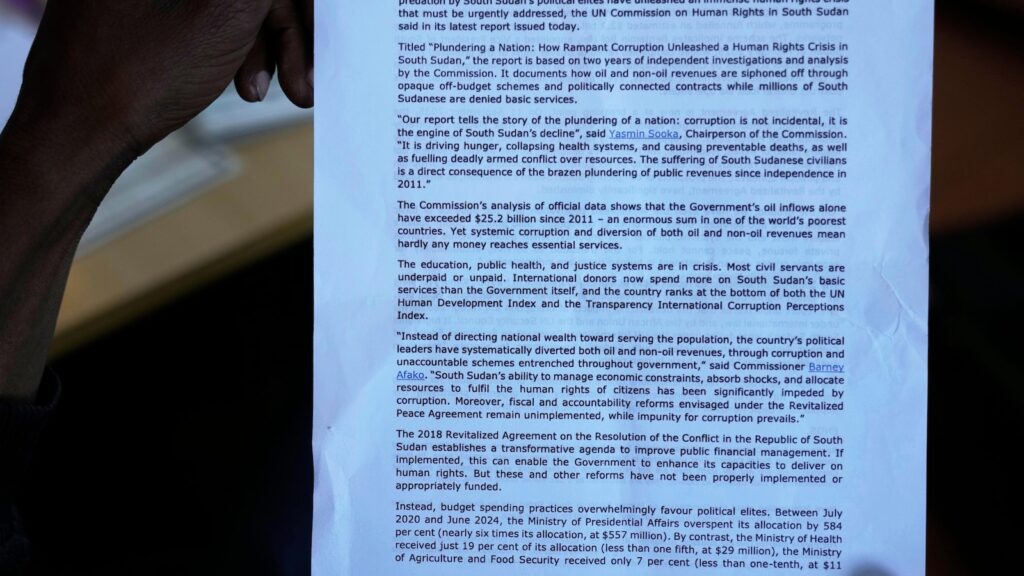South Sudan Faces Deepening Corruption While Hunger Crisis Escalates
Overview of Corruption in South Sudan
In a recent report by the U.N. Commission on Human Rights in South Sudan, it has been revealed that billions of public dollars have been misappropriated through extensive government corruption. This alarming trend has occurred over the past decade, significantly impacting the lives of South Sudan’s population, which is currently approaching 11 million. The country, which gained independence from Sudan in 2011 after decades of civil conflict, is now grappling with a severe food crisis while a select group of political elites enrich themselves.
Corruption Schemes Uncovered
The U.N. report outlines various schemes allegedly orchestrated by political officials to siphon off substantial public revenues. Among these is the government’s oil-for-roads program—a key infrastructure initiative aimed at utilizing oil revenues for development. Shockingly, the report indicates that $1.7 billion out of $2.2 billion allocated for this program remains unaccounted for, with 95% of the necessary roads yet to be completed.
Key Actors in Corruption
The report highlights that much of the diverted funds are linked to Benjamin Bol Mel, a businessman who is closely associated with President Salva Kiir and was recently appointed as one of five vice presidents. Notably, Bol Mel is under U.S. sanctions, along with several companies he controls. The government has dismissed these allegations as “absurd” and claims the report is a deliberate attempt to tarnish its image.
Additionally, the report points to the “politically connected” company, Crawford Capital Ltd., which has allegedly exploited irregular government e-services to capture millions of dollars through electronic visa processes and tax collections.
Worsening Food Crisis
The dire state of South Sudan’s food security cannot be overstated. Food security analysts report that 76 out of 79 counties are experiencing extreme food insecurity. Alarmingly, less than 1% of the federal budget has been designated for ministries responsible for addressing food security from 2020 to 2024. During the 2022-2023 fiscal year, spending on the president’s personal medical services exceeded that of nationwide healthcare.
The government’s inability to effectively respond to the escalating food crisis reflects a broader neglect of its responsibilities to the populace. The report emphasizes that while a small number of individuals engage in corrupt practices, the government has essentially outsourced essential services to international donors.
Government Response and International Context
In response to these allegations, the South Sudanese government has pointed to international sanctions and declining oil production as obstacles to funding public services. However, many experts argue that these claims divert attention from the pervasive issue of corruption that has long been rampant in the nation.
Previous investigations, including a U.N. report from 2021, revealed tens of millions of dollars in unaccounted government revenue. The ongoing corruption situation poses severe risks, including a backslide into full-scale war, a concern amplified by recent political unrest.
Rising Tensions in the Political Landscape
Adding to the turmoil, opposition leader Riek Machar was recently suspended from his position as first vice president after being charged with serious offenses including murder and terrorism. His political fate is now uncertain, and he remains under house arrest following violent clashes involving militia groups.
Conclusion: The Path Forward for South Sudan
The latest U.N. report serves as a stark warning of the systemic corruption plaguing South Sudan. As the food crisis worsens and political instability rises, it is crucial for both local and international entities to hold accountable those responsible for the misappropriation of public funds. Addressing these challenges will be vital for the future stability and prosperity of South Sudan.
For a deeper understanding of the ongoing issues in South Sudan, visit U.N. Human Rights.
By maintaining transparency and engaging in meaningful reforms, South Sudan can hope to enhance its governance and improve the living conditions of its citizens.
